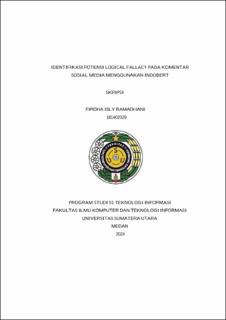| dc.description.abstract | Usage of social media and internet in general in Indonesia is growing, it is known that as many as 60,4% of Indonesian population are active sosial media users. Social media has many benefits such as seeking advice, sharing information, and exchanging opinions with other sosial media users. But, based on several studies that previously have been made, it is shown that social media has a notable role in spreading logical fallacy which causes misinformation to spread more easily, worsening quality of online discussions, and can negatively influence public opinion. The lack of understanding about logical fallacy makes social media users vulnerable to misinformation and manipulation, which is quite worrying because comments with logical fallacy that are rampant on social media can lead to miscommunication, polarization of opinions, and worsening public opinion. Thus, it is necessary to create an approach that can identify potential logical fallacy in social media comments in order to prevent misinformation and manipulation. The research conducted is identification using IndoBERT with more than 14000 data that has been collected. The accuracy result of the trained model is 78,77%, with ‘Fallacy’ class having an F1-score of 0.80 and ‘No fallacy’ class having an F1-score of 0.78. | en_US |


